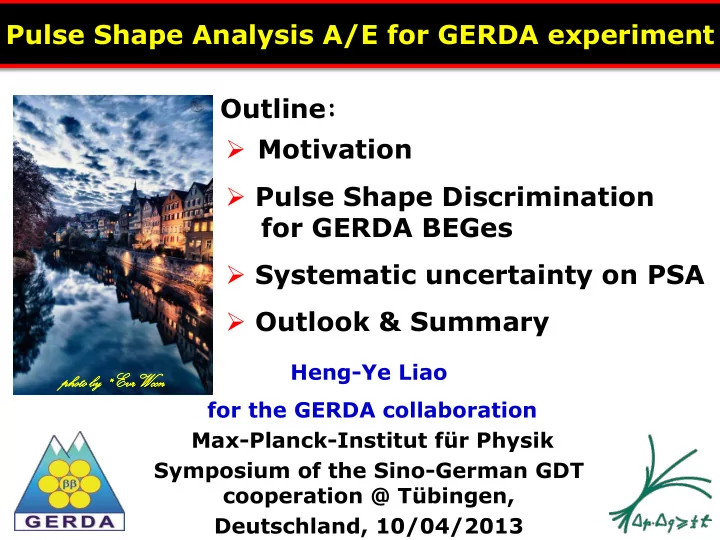

Pulse Shape Analysis A/E for GERDA experiment Outline : Motivation Pulse Shape Discrimination for GERDA BEGes Systematic uncertainty on PSA Outlook & Summary Heng-Ye Liao photo o by *EvrWccn Wccn for the GERDA collaboration Max-Planck-Institut für Physik Symposium of the Sino-German GDT cooperation @ Tübingen, Deutschland, 10/04/2013
Neutrinoless Double Beta Decay Experimental Signature: 2 decay: L=0 νββ Sharp peak @ (A,Z) (A,Z+2) +2e - +2 Q ββ ( 76 Ge) = 2039 keV SM allowed & observed 2 0 decay: L=2 arbitrary units (A,Z) (A,Z+2) +2e - 0 if is Majorana particle Use Detector made of ββ emitting material: HP 76 Ge detector Energy (keV) 0 decay can help us learn more on: Nature of the neutrino (Majorana or Dirac?) Set the limits of absolute mass scale -> Mass hierarchy of neutrinos Information on CP violating phases 2
Motivation GERDA: Searching for 0 νββ decay Background recognition utilizing PSD method Define PSD parameters for SSE/MSE discrimination using 228 Th calibration source Event topology & event location distribution : - 0 νββ ≅ 2 νββ except E dependence - Calibration ?= 2 νββ Investigate systematic uncertainty due to event topology & event location on PSD The method: Comparison of PSD for 2 νββ /calibration data 3
GERDA - Germanium Detector Array Clean room Lock system Cryostat Detector array with internal Cu shield Water tank with HP water and -veto HP liquid Ar 4
Pre-test mode for GERDA Phase-II GERDA Phase-I using 6 coaxial enr Ge detectors Pre-test mode for Phase-II: Additional 5 enr BEGe detectors Advantages of BEGe detectors: - ΔE < 3.0keV @ 2.6 MeV - Powerful PSD: A/E parameter Total mass of enr BEGe detectors: - 3.6 kg Data taking: Since July, 2012 Exposure: - 2 νββ : 0.59 kg ∙yr 5
A/E : Pulse Shape Discrimination Method ϒ 0 νββ Multi-site Single-site event event charge pulse charge pulse A A’ current pulse current pulse Dušan Budjaš et al, JINST 4 P10007, 2009 A/E PSD method: Use “Ratio of Maximum Amplitude to E nergy” for discriminating SSE/MSE 6
Determination of PSD cut A/E Distribution with 228 Th source Energy spectrum SSE with 228 Th source - Before PSD - After PSD FEP(MSE) DEP(0 -like) 1621 keV 1593keV MSE ~10% survival > 90% survival PSD Cut A/E cut : Dušan Budjaš et al, JINST 4 P10007, 2009 Cut value is determined by using 228 Th source SSE/MSE are located in/below a horizontal band Double escape peak (DEP) from the 208 Tl-line @ 2614.5 keV are mostly SSE Full energy peaks (FEP) contain large fraction of MSE 7 Acceptance in DEP usually set to 90%
Determination of cut values is happy however …. D on’t forget the systematic uncertainty on your PSD method!! An example of systematic effect on PSD: A/E 2 νββ Calibration using 228 Th source 8 Energy (keV)
A/E-versus-E for 2 νββ /calibration data Agamennone 2 νββ Calibration Andromeda Anubis Achilles Aristoteles 9
SSE for calibration data SSE Calibration Tail: MSE Selected region μ of (A/E) SSE 10
SSE for 2 νββ data Blinding SSE MSE μ : mean value μ of (A/E) SSE Energy region for consistency check : 600 keV - 1.4 MeV, Δ E = 200 keV 11
Consistency check for two methods Preliminary systematic uncertainty on PSD ~ 0.1% Understanding & reducing deviations between 2 νββ & calibration =>Working in progress 12
A/E Resolution as function of Energy μ 1 σ 2 σ 3 σ Calibration μ σ σ (A/E) SSE : standard deviation of fitted Gaussian & μ (A/E) SSE : mean value of fitted Gaussian …. A/E (E) Improvement in recognition efficiency of SSE/MSE 13
Outlook & Summary PSD can reduce background & improve sensitivity for 0 νββ experiments A/E for BEGes provides powerful SSE/MSE pulse shape recognition efficiency Systematic uncertainty is crucial for determining the cut value of PSD Deviations between methods dominated by statistical uncertainties Possible improvement in recognition eff. of SSE/MSE by A/E(E) 14
Backup Slides 15
Neutrinoless Double Beta Decay Nature of the neutrino (Majorana or Dirac?) Set the limits of absolute mass scale -> Mass hierarchy of neutrinos Information on CP violating phases The observable: half life Effective Majorana Matrix Phase space Neutrino mass factor element 0 νββ Decay rate ~ Q 5 One measurement, many answers (or questions)… 16
Experimental Challenge ~ 30 isotopes are available, but … Measuring Active target mass Detection efficiency time Sensitivity of Isotopic Abundance Energy Resolution Background index Why HP 76 Ge detector ? High detection efficiency (source=detector) Very good energy resolution (0.2% in ROI) Very low intrinsic background 17
GERDA: Phases & Goals claim Goal of Phase I: ~ 230 meV Goal of Phase II: ~ 100 meV Inverted hierarchy Ton scale experiment phase II: 100 kg-yr normal hierarchy phase I: 15 kg-yr claim Phase I – Test claim, 15 kg-yr Phase II – Improve limits on T 1/2 , 100 kg-yr, additional 30 enriched BEGe detectors (20kg) 18
Recommend
More recommend